|
|
|
Sort Order |
|
|
|
Items / Page
|
|
|
|
|
|
|
| Srl | Item |
| 1 |
ID:
180661
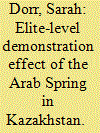

|
|
|
|
|
| Summary/Abstract |
What impact has the ‘Arab Spring’ had upon Kazakhstan's approach to regime security? Short of the possibility of a ‘Central Asian Spring’, if and how the Arab Spring reshaped this authoritarian regime has not been addressed. A longitudinal narrative analysis of Kazakhstan's presidential rhetoric from 2005 to 2015 and fieldwork interviews indicated that the Arab Spring uprisings brought about an elite-level demonstration effect. That is, the regime perceived a heightened threat to its security as a result of instability and regime responses elsewhere, and it sought to shore-up its position and forestall the emergence of local challenges as a consequence of this, whether through discourse, behaviour or policy. This suggests that uprisings elsewhere, including those outside of a state's immediate region, can affect perceptions of regime security in the medium term, despite the absence of domestic unrest at home and a lack of close social and cultural ties between regions.
|
|
|
|
|
|
|
|
|
|
|
|
|
|
|
|
| 2 |
ID:
140173
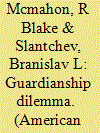

|
|
|
|
|
| Summary/Abstract |
Armed forces strong enough to protect the state also pose a threat to the state. We develop a model that distills this “Guardianship Dilemma” to its barest essentials, and show that the seemingly ironclad logic underlying our existing understanding of civil-military relations is flawed. Militaries contemplating disloyalty must worry about both successfully overthrowing the government and defeating the state’s opponent. This twin challenge induces loyalty as the state faces increasingly strong external threats, and can be managed effectively by rulers using a number of policy levers. Disloyalty can still occur when political and military elites hold divergent beliefs about the threat environment facing the state, since militaries will sometimes have less incentive to remain loyal than the ruler suspects. Consequently, it is not the need to respond to external threats that raises the risk of disloyalty—as conventional wisdom suggests—but rather uncertainty about the severity of these threats.
|
|
|
|
|
|
|
|
|
|
|
|
|
|
|
|
| 3 |
ID:
140818
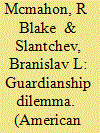

|
|
|
| 4 |
ID:
152977
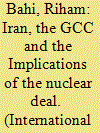

|
|
|
|
|
| Summary/Abstract |
The Joint Comprehensive Plan of Action, also known as the Iran nuclear deal, is consequential for Middle East regional security. It has raised a number of concerns for Arab Gulf states in relation to an emboldened Iran after sanction relief and the perceived shift of the US away from supporting its traditional allies in the Gulf. The international recognition and incorporation of Iran into regional power constellations resulting from the deal will intensify Saudi-Iranian rivalry to assert dominance. This rivalry and competition will increase in the short run, however, regional crises are expected to highlight the need for dialogue and engagement on regional affairs.
|
|
|
|
|
|
|
|
|
|
|
|
|
|
|
|
| 5 |
ID:
091431
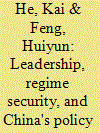

|
|
|
|
|
| Publication |
2009.
|
| Summary/Abstract |
Traditional analyses of Taiwan crises have relied mainly on deterrence theory for their explanatory power. This approach fails to account for China's risk-taking behavior, which can be explained by prospect theory. We suggest that Chinese leaders are more likely to use more risky military coercion against Taiwan's pro-independence movements within a domain of losses, i.e., when their regime faces serious domestic and international challenges to its security. Conversely, Chinese leaders are more likely to employ less risky political pressure to oppose Taiwan's pro-independence forces if their decision making takes place in a domain of gains, i.e., when the security of China's regime is not challenged. We conclude that maintaining a good US-China relationship is the best strategy for the United States to help prevent military crises in the Taiwan Strait.
|
|
|
|
|
|
|
|
|
|
|
|
|
|
|
|
| 6 |
ID:
124999
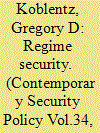

|
|
|
|
|
| Publication |
2013.
|
| Summary/Abstract |
The literature on the proliferation of chemical and biological weapons (CBW) emphasizes the role of external security threats as the primary motive for states to acquire and use these weapons. As recent events in Syria demonstrate, governments lacking political legitimacy may use these weapons to repress domestic challenges to their rule. The concept of regime security provides a theoretical framework for understanding how the threat of military coups, insurgencies, or domestic rivals influences the acquisition and use of CBW by authoritarian regimes. The cases of South Africa and Iraq illustrate how a government's concerns about internal security threats can impact its CBW proliferation decision-making. Omitting regime security as a factor in CBW decision-making may lead to the adoption of inappropriate nonproliferation and deterrent strategies. In light of Syrian President Bashar al-Assad's use of chemical weapons against his own people, developing a deeper understanding of the influence of regime security on the acquisition and use of chemical and biological weapons should be a priority.
|
|
|
|
|
|
|
|
|
|
|
|
|
|
|
|
| 7 |
ID:
158283
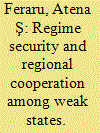

|
|
|
|
|
| Summary/Abstract |
This article focuses on a category of states, referred to as weak, proven to evade entrenched international relations theoretical assumptions relating to sovereignty and government interests. It renounces these premises and builds on the argument that state weakness generates a peculiar security predicament that shapes governments’ internal agenda. It focuses on Migdal’s (1988) findings of a regime security-centered mindset shared by weak states’ leaders and asks the following: does this common mindset generate a common approach to regional cooperation? It answers this question by inferring a set of strategies toward external cooperation and proceeds by testing their empirical validity in relation to three of the most integrated regional organizations in Southeast Asia, Africa, and the American continent.
|
|
|
|
|
|
|
|
|
|
|
|
|
|
|
|
| 8 |
ID:
141149
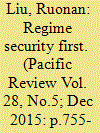

|
|
|
|
|
| Summary/Abstract |
China's rise in recent years has exacerbated Vietnam–China security tensions over maritime disputes in the South China Sea. To manage its security competition with China, Vietnam has simultaneously improved its security cooperation with the United States while maintaining a safe distance from it, in efforts to reassure China. This article attempts to explore the dynamics of the Vietnam's security policy towards the United States and China in the Post-Cold War era. The authors find that the combinations of Vietnam's Post-Cold War security policy towards the United States and China are shaped by its concerns over regime security with respect to the primary threats of infiltration by US democratic norms and of excessive anti-Chinese nationalism. The relative levels of both these risks lead to various combinations of Vietnam's security policies vis-à-vis the United States and China.
|
|
|
|
|
|
|
|
|
|
|
|
|
|
|
|
| 9 |
ID:
180316
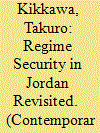

|
|
|
|
|
| Summary/Abstract |
Jordan is one of the few authoritarian Arab regimes that survived region-wide mass protests during the Arab Spring, although the monarchy lacked enough force or resources to neutralize the dissident. This study analyzes the source of the resiliency of the Hashemite monarchy during 2011–2020 concerning regime security. The retreat of the Jordanian democratization movements in the early phase of the Arab Spring was the consequence of the opposition’s failure to achieve coordination and alignment, particularly the internal struggle of the Muslim Brotherhood regarding how to respond and its successful co-optation by the government. The scope of regime security in Jordan experienced a dramatic shift from appeasement to coercion around 2014 because of the eroding social order in neighboring states, represented by the influx of Syrian refugees into Jordan and the rise of the Islamic State in Iraq. Actions for securitization against Islamists, namely increased policing and tighter border control, were arranged through coercion and securing mass support in tandem. Jordan’s experience illustrates how this typically “weak state” secured its survival in this unprecedented, rapidly changing security situation.
|
|
|
|
|
|
|
|
|
|
|
|
|
|
|
|
| 10 |
ID:
146183
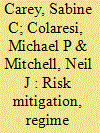

|
|
|
|
|
| Summary/Abstract |
In Thailand, India, Libya, and elsewhere, governments arm the populace or call up volunteers in irregular armed groups despite the risks this entails. The widespread presence of these militias, outside the context of state failure, challenges the expectation that governments uniformly consolidate the tools of violence. Drawing on the logic of delegation, we resolve this puzzle by arguing that governments have multiple incentives to form armed groups with a recognized link to the state but outside of the regular security forces. Such groups offset coup risks as substitutes for unreliable regular forces. Similar to other public-private collaborations, they also complement the work of regular forces in providing efficiency and information gains. Finally, these groups distance the government from the controversial use of force. These traits suggest that militias are not simply a sign of failed states or a precursor to a national military, but an important component of security portfolios in many contexts. Using cross-national data (1981–2005), we find support for this mix of incentives. From the perspective of delegation, used to analyze organizational design, global accountability, and policy choices, the domestic and international incentives for governments to choose militias raise explicit governance and accountability issues for the international community.
|
|
|
|
|
|
|
|
|
|
|
|
|
|
|
|
| 11 |
ID:
157893
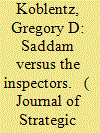

|
|
|
|
|
| Summary/Abstract |
The discovery that Iraq had no weapons of mass destruction (WMD) in 2003 raised the question of why Saddam had prevented UN weapons inspectors from fully accounting for his disarmament. The leading explanation for Saddam’s behavior is that he valued ambiguity as part of a strategy of ‘deterrence by doubt’. This article argues that Iraq’s obstruction of inspectors in the late 1990s was motivated by his desire to shield Iraq’s regime security apparatus from UNSCOM’s intrusive counter-concealment inspections. The failure to understand how strongly Saddam’s concerns about his personal safety drove Iraq’s contentious relationship with UNSCOM set the stage for the invasion of Iraq in 2003.
|
|
|
|
|
|
|
|
|
|
|
|
|
|
|
|
| 12 |
ID:
146993
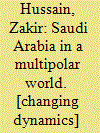

|
|
|
|
|
| Edition |
South Asia ed.
|
| Publication |
Oxon, Routledge, 2016.
|
| Description |
xvi, 266p.: figures, tableshbk
|
| Standard Number |
9781138217812
|
|
|
|
|
|
|
|
|
|
|
|
Copies: C:1/I:0,R:0,Q:0
Circulation
| Accession# | Call# | Current Location | Status | Policy | Location |
| 058770 | 327.538/HUS 058770 | Main | On Shelf | General | |
|
|
|
|
| 13 |
ID:
147469
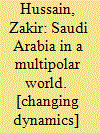

|
|
|
|
|
| Edition |
South Asia ed.
|
| Publication |
Oxon, Routledge, 2016.
|
| Description |
xvi, 266p.: figures, tableshbk
|
| Standard Number |
9781138217812
|
|
|
|
|
|
|
|
|
|
|
|
Copies: C:1/I:0,R:0,Q:0
Circulation
| Accession# | Call# | Current Location | Status | Policy | Location |
| 058795 | 327.538/HUS 058795 | Main | On Shelf | General | |
|
|
|
|
| 14 |
ID:
172851
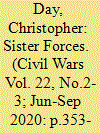

|
|
|
|
|
| Summary/Abstract |
In many African states, park rangers perform a variety of roles as armed state actors. Facing the overlapping challenges of wildlife management and regime security, many have become increasingly militarized, with significant degree of variation. Using case studies from Uganda, Rwanda, Democratic Republic of Congo, and South Sudan, this article provides an expanded conceptualization of militarization that configures two characteristics of Africa’s park rangers: 1) their integration into or insulation from the state security apparatus, and 2) their coercive roles of either law enforcement or combat. The article builds an argument that takes into account colonial institutions and civil-military relations.
|
|
|
|
|
|
|
|
|
|
|
|
|
|
|
|
| 15 |
ID:
182460
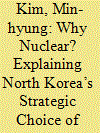

|
|
|
|
|
| Summary/Abstract |
This article seeks to provide a theoretically compelling account for North Korea’s strategic choice to go nuclear and explores its implications for East Asian security. Its main research question is as follows: despite the obvious risks of going nuclear, what makes North Korea so desperate in its pursuit of nuclear capabilities? Contrary to the extant accounts that only emphasize either nonsecurity variables or an “external security” factor, this article conceptualizes North Korea’s security considerations as “regime survival” and explains its strategic choice from it. The central thesis of this article is that North Korea’s decision to go nuclear is a strategic choice, of which the purpose is to achieve its goals of safeguarding independence from external powers as well as ensuring regime security. North Korea pursues nuclear weapons because they not only protect Pyongyang’s regime from foreign aggressions but also help to consolidate Kim Jong-un’s domestic power. North Korea also seeks nuclear weapons in order to safeguard its independence and autonomy from China because the removal of China’s influence is critical to ensuring its regime survival in the long run. North Korea’s strategic choice to go nuclear and its emergence as a de facto nuclear power have significant implications for East Asian security.
|
|
|
|
|
|
|
|
|
|
|
|
|
|
|
|
|
|
|
|
|